Appreciative Inquiry
|
Field of application |
The appreciative approach can be used as a complete analytical framework involving a variety of interviews. The latter can span over a longer period of time with intensive field work. This description focuses on a workshop format that can be used
|
|
Resume / Brief description |
The Appreciative Inquiry has been developed and used as an alternative to a problem-based approach of process analysis, intervention design and vision building. It is strongly based on appreciation of what is already there and on what can be strengthened (“What gives life”). It starts with an understanding of the organisation's or individual´s potential strengths by looking at its experience and its potential. From there an envisioning process starts on how a possible future could look like (“What might be”) and how this future can be co-constructed, and its process maintained as a dynamic and sustainable process.
|
|
Target group
|
|
|
Objectives |
|
|
Requirements
|
Application
Material
Time
|
|
Implementation - Overview |
The activity is realised in four main phases.
|
|
Implementation - Guidelines
|
1. Discovery: What gives life (Appreciating)
“What is the development and change focus we want to take in this workshop?” is the question that needs to be clarified in the beginning. The group of participants has to define the topic. Is the reflection related to future cooperation between students and faculty, the improvement of cooperation between the university department, an organisation or a territory?
Then, the group is asked: “Please share your best and most encouraging and “life-giving” experiences on the change topic of the workshop?”
Personal and organisational high points, as well as the participants' values, hopes and wishes related to the enhancement of their organisation’s social, economic and environmental vitality are discovered.
The experiences are documented on cards on the first pin board by the facilitator. They are clustered in the two areas "experiences" and "values".
There are two alternatives to speed up the process:
2. Dream: What might be (Envsioning)
The facilitator asks the participants (using the second pin board): "What can you envision as a possible motivational ideal status when things would work at their best?
There are two alternatives on how to start:
3. Design: How it can be (Co-constructing)
The focus at this stage of the workshop is to look at the clusters of dreams expressed in the earlier step.
The question the facilitator asks: “What activities can we realise that contribute to our envisioned change? Please reflect about activities that create enthusiasm with you and to which you want to contribute.”
Participants then reflect on concrete activities necessary to reach these specific dreams.
The card exercise should be done in groups of 4 or 5 to encourage joint reflection. Cards are written by the groups.
Groups present their findings and cards on the third pin board. Duplicated cards are taken out, similar ones are clustered.
The participants then prioritise activities through reflection and voting.
4. Destiny: What will be (Sustaining)
The destiny phase is focusing on the concrete planning of the activities and to “embrace the solutions”. The assurance that these activities are also really implemented and monitored is understood as a deep interest of the organisation itself.
The logic is that the outcomes of the Appreciative Inquiry are building on the strengths of the individuals in the organisation, on internal resources, relationships, past positive experiences and the extension of these positive experiences.
The workshop can be concluded with an action plan. As an alternative, a first draft of an action plan is developed by a group of participants and will be presented to the other participants.
The workshop closes with an appreciation of the success.
|
|
Example of application: |
Description of the context
The Appreciative Inquiry method was used in a workshop from the consultancy company Mesopartner with a German district development agency to reflect about future steps of action. At the same time, the workshop was an organisational development workshop. The objectives were threefold:
Starting point
The workshop started with a joint rating on different circumstances:
"Discovery" and "Dream" process
The team of the agency started to share their positive experiences along the differentiation of experiences and values. Some examples of relevant outcomes included:
In regards to values the following aspects were mentioned:
In the "Dream" process relevant aspects included:
"Design" and "Destiny" process
In the "Design" and "Destiny" process some of the outcomes were mentioned:
Support requirements
The workshop took place from 9 to 12 am (3 hours). The pin boards were prepared in advance and the role of the facilitator was mainly to guide the group through the process and to provide a space where team members were able to express their emotions and motivations.
|
|
Templates, graphics for download
|
Visualisations for Appreciate Inquiry Workshops are available at: https://www.centerforappreciativeinquiry.net/wp-content/uploads/2018/01/AI_CaseStudyExamples_HeatherMartinez_20170212.pdf |
|
Additional format/ references
|
Videos
Reading
|

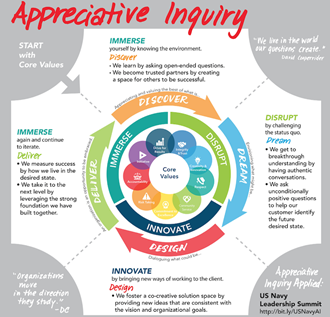
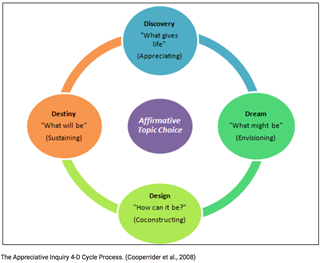
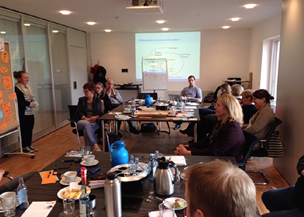
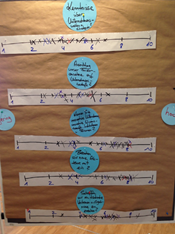
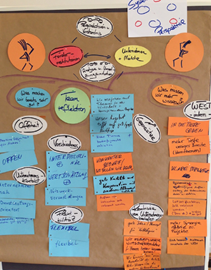
No Comments